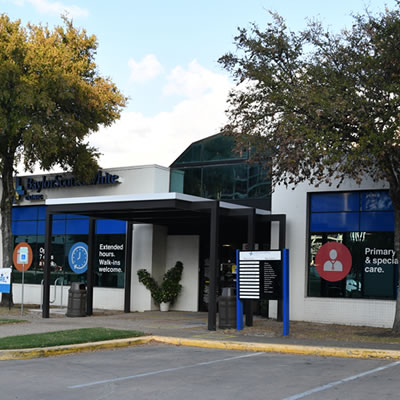Primary care in Austin, TX
If you've been wondering, "where is a primary care physician near me," we have many primary care clinics in Austin, TX. A primary care physician (PCP) treats patients for common healthcare needs, like your annual physical, immunizations (flu shots and travel medicine), new prescriptions, sore throat, cold or flu symptoms, back pain and even minor injuries and possible broken bones. Your family doctor in Austin also helps keep you up to date for important preventive health services, like mammograms and colorectal screenings. If you have diabetes, high blood pressure, high cholesterol, congestive heart failure or another chronic condition, your primary care physician provides ongoing monitoring and a consistent voice about your care. Learn more about primary care
- Annual physicals
- Disease prevention
- Immunizations
- Wellness and prevention screenings
- Diagnosis and treatment of acute and chronic illnesses
- Same-day care, where available
- Patient education
- Cold and flu symptoms
- Allergies
- Asthma
- High blood pressure
- High cholesterol
- Diabetes
- Mental health needs
- Sore back
- Urinary tract infection (UTI)
- Rash without fever
Many of our primary care locations offer walk-in hours, so you can get care on your schedule. Find a primary care clinic near you.
After-hours and weekend clinics
Some of the primary care physicians at our clinics see patients after hours and even on weekends. Search for primary care near where you live.
We've made it easy for you to schedule an online doctor appointment to get the care you need when you need it. Schedule a virtual care appointment today.
From wellness and fitness classes to support groups, we're proud to be a partner in your health helping you get better and stay better.

Baylor Scott & White Clinic - Austin Circle C
5000 W Slaughter Ln Building 6, Ste 100, Austin, TX, 78749
- Monday: 8:00 am - 5:00 pm
- Tuesday: 8:00 am - 5:00 pm
- Wednesday: 8:00 am - 5:00 pm
- Thursday: 8:00 am - 5:00 pm
- Friday: 8:00 am - 5:00 pm

Baylor Scott & White Clinic - Austin Downtown
200 E Cesar Chavez St Ste G140, Austin, TX, 78701
- Monday: 8:00 am - 5:00 pm
- Tuesday: 8:00 am - 5:00 pm
- Wednesday: 8:00 am - 5:00 pm
- Thursday: 8:00 am - 5:00 pm
- Friday: 8:00 am - 5:00 pm

Baylor Scott & White Clinic - Austin North Burnet
2608 Brockton Dr , Austin, TX, 78758
- Monday: 8:00 am - 5:00 pm
- Tuesday: 8:00 am - 5:00 pm
- Wednesday: 8:00 am - 5:00 pm
- Thursday: 8:00 am - 5:00 pm
- Friday: 8:00 am - 5:00 pm

Baylor Scott & White Clinic - Austin Oak Hill
5251 US 290 , Austin, TX, 78735
- Monday: 8:00 am - 5:00 pm
- Tuesday: 8:00 am - 5:00 pm
- Wednesday: 8:00 am - 5:00 pm
- Thursday: 8:00 am - 5:00 pm
- Friday: 8:00 am - 5:00 pm

Baylor Scott & White Clinic - Austin Onion Creek
11209 S Interstate 35 , Austin, TX, 78747
- Monday: 7:15 am - 6:00 pm
- Tuesday: 7:15 am - 6:00 pm
- Wednesday: 7:15 am - 6:00 pm
- Thursday: 7:15 am - 6:00 pm
- Friday: 7:15 am - 6:00 pm
- Monday: 8:20 am - 4:00 pm
- Tuesday: 8:20 am - 4:00 pm
- Wednesday: 8:20 am - 4:00 pm
- Thursday: 8:20 am - 4:00 pm
- Friday: 8:20 am - 4:00 pm

Baylor Scott & White Clinic - Westlake
1001 Westbank Dr , West Lake Hills, TX, 78746
- Monday: 8:00 am - 5:00 pm
- Tuesday: 8:00 am - 5:00 pm
- Wednesday: 8:00 am - 5:00 pm
- Thursday: 8:00 am - 5:00 pm
- Friday: 8:00 am - 5:00 pm
Frequently Asked Questions
-
What is family medicine?Family medicine is a general term used to describe the routine care provided by a primary care physician in Austin. These medical experts provide a wide range of primary care, including annual wellness visits, routine immunizations, mental health assessments, and ongoing treatment for common chronic medical conditions.
-
How to find a primary care doctorFind a primary care doctor near you to schedule an appointment in Austin at Baylor Scott & White.
-
What is a primary care provider?A primary care provider is a general practitioner (also called a family doctor) who provides ongoing, routine care. Common things that primary care providers see patients for include annual wellness check-ups, immunizations, health screenings, and chronic disease management.
-
How to find a primary care physician who offers video visits?If you'd like to talk to a primary care provider remotely during a virtual care appointment, you can easily search for a primary care physician who offers video visits.

